阅读理解之词义猜测题
(完整版)词义猜测题
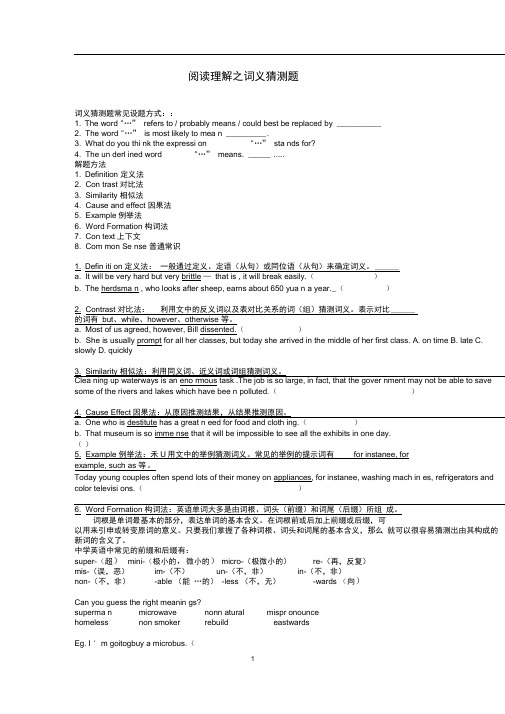
阅读理解之词义猜测题词义猜测题常见设题方式::1. The word "…” refers to / probably means / could best be replaced by __________2. The word "…” is most likely to mea n _________ .3. What do you thi nk the expressi on "…” sta nds for?4. The un derl ined word "…” means. _____ .....解题方法1. Definition 定义法2. Con trast 对比法3. Similarity 相似法4. Cause and effect 因果法5. Example例举法6. Word Formation 构词法7. Con text上下文8. Com mon Se nse 普通常识1. Defin iti on 定义法:一般通过定义、定语(从句)或同位语(从句)来确定词义。
______a. It will be very hard but very brittle —that is , it will break easily.()b. The herdsma n , who looks after sheep, earns about 650 yua n a year._()2. Contrast 对比法:利用文中的反义词以及表对比关系的词(组)猜测词义。
表示对比______的词有but、while、however、otherwise 等。
a. Most of us agreed, however, Bill dissented.()b. She is usually prompt for all her classes, but today she arrived in the middle of her first class. A. on time B. late C. slowly D. quickly3. Similarity 相似法:利用同义词、近义词或词组猜测词义。
中考英语阅读理解词义猜测题单选题40题

中考英语阅读理解词义猜测题单选题40题1.The boy was very happy and ran around like a wild animal. What does “wild” mean?A.calmB.angryC.fierce and not controlledD.sad答案:C。
“wild”表示“野蛮的、未被驯服的、不受控制的”。
A 选项“calm”是“平静的”;B 选项“angry”是“生气的”;D 选项“sad”是“悲伤的”。
根据上下文,男孩高兴得像个野生动物一样跑来跑去,可推测“wild”在这里是“fierce and not controlled”(凶猛且不受控制的)的意思。
2.The girl had a beautiful smile that lit up the room. What does “lit up” mean?A.cleanedB.brightenedC.decoratedD.warmed答案:B。
“lit up”表示“照亮、使明亮”。
A 选项“cleaned”是“打扫”;C 选项“decorated”是“装饰”;D 选项“warmed”是“使温暖”。
根据上下文,女孩的微笑照亮了房间,可推测“lit up”在这里是“brightened”((使明亮)的意思。
3.The old man walked slowly with a cane. What does “cane” mean?A.stickB.hatC.shoeD.coat答案:A。
“cane”表示“手杖”。
B 选项“hat”是“帽子”;C 选项“shoe”是“鞋子”;D 选项“coat”是“外套”。
根据上下文,老人拿着一根手杖慢慢地走,可推测“cane”在这里是“stick”(棍子、手杖)的意思。
4.The dog barked loudly at the stranger. What does “barked” mean?A.jumpedB.ranC.shoutedD.whispered答案:C。
高一英语阅读理解词义猜测题单选题40题答案解析版
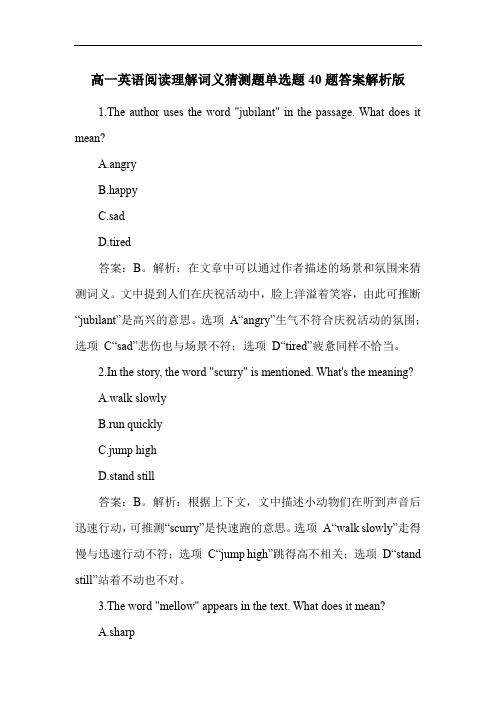
高一英语阅读理解词义猜测题单选题40题答案解析版1.The author uses the word "jubilant" in the passage. What does it mean?A.angryB.happyC.sadD.tired答案:B。
解析:在文章中可以通过作者描述的场景和氛围来猜测词义。
文中提到人们在庆祝活动中,脸上洋溢着笑容,由此可推断“jubilant”是高兴的意思。
选项A“angry”生气不符合庆祝活动的氛围;选项C“sad”悲伤也与场景不符;选项D“tired”疲惫同样不恰当。
2.In the story, the word "scurry" is mentioned. What's the meaning?A.walk slowlyB.run quicklyC.jump highD.stand still答案:B。
解析:根据上下文,文中描述小动物们在听到声音后迅速行动,可推测“scurry”是快速跑的意思。
选项A“walk slowly”走得慢与迅速行动不符;选项C“jump high”跳得高不相关;选项D“stand still”站着不动也不对。
3.The word "mellow" appears in the text. What does it mean?A.sharpB.softC.loudD.quiet答案:B。
解析:从文章中对音乐或氛围的描述可以推断“mellow”的意思。
文中提到音乐让人放松,氛围很温和,所以“mellow”是柔和的意思。
选项A“sharp”尖锐不符合;选项C“loud”大声不对;选项D“quiet”安静不准确。
4.The author writes about a "vivacious" person. What does "vivacious" mean?A.boringB.livelyC.shyD.calm答案:B。
超实用高考英语复习: 阅读理解突破之词义猜测题(原卷版)

阅读理解突破之词义猜测题距离高考还有一段时间,不少有经验的老师都会提醒考生,愈是临近高考,能否咬紧牙关、学会自我调节,态度是否主动积极,安排是否科学合理,能不能保持良好的心态、以饱满的情绪迎接挑战,其效果往往大不一样。
以下是本人从事10多年教学经验总结出的以下学习资料,希望可以帮助大家提高答题的正确率,希望对你有所帮助,有志者事竟成!养成良好的答题习惯,是决定高考英语成败的决定性因素之一。
做题前,要认真阅读题目要求、题干和选项,并对答案内容作出合理预测;答题时,切忌跟着感觉走,最好按照题目序号来做,不会的或存在疑问的,要做好标记,要善于发现,找到题目的题眼所在,规范答题,书写工整;答题完毕时,要认真检查,查漏补缺,纠正错误。
总之,在最后的复习阶段,学生们不要加大练习量。
在这个时候,学生要尽快找到适合自己的答题方式,最重要的是以平常心去面对考试。
英语最后的复习要树立信心,考试的时候遇到难题要想“别人也难”,遇到容易的则要想“细心审题”。
越到最后,考生越要回归基础,单词最好再梳理一遍,这样有利于提高阅读理解的效率。
另附高考复习方法和考前30天冲刺复习方法。
高考命题取向正确理解文中单词或短语的含义是理解文章的第一步,也是理解文章的基础,不懂单词含义根本就谈不上理解文章。
但英语单词、短语的含义并非完全等同于词典中所标注的汉语意思,其含义随不同语境会有所不同。
能根据上下文理解灵活变化的词义,才算是真正初步具备了一定的阅读理解能力。
在高考阅读理解中,词义猜测题通常有以下三种情况:推测划线单词或短语的含义;推测划线代词指代含义;推测划线句子的含义。
对于推测划线单词或短语的含义,可以依据定义、同位语、文章中的例子、对比关系或比较关系、构词法、并列结构、因果关系等来解题;对于推测代词含义,可以从宏观上充分把握代词指代内容涉及段落的整体含义,并从微观入手抓住关键词或关键句,弄清逻辑关系(因果关系,转折关系,补充说明,对比关系等)来解题;关于推测划线句含义,采用三步法—一定位,返回原文,定位划线句子,理清句子结构;二分析,分析划线句子前后语境,根据关键信息和逻辑关系(因果关系,转折关系,补充说明,对比关系等)合理推断句意;三比较,比较选项,找出与推断出的句义相似的选项。
高考英语阅读理解 词义猜测

词义猜测知识摘要一、高考阅读理解词义猜测类题目常见的设问方式1. The word “…” refers to/ probably means ________.2. The underlined word “…” could best be replaced by ________.3. What do you think the expression “…” stands for?4. By saying “…” we mean ________.5. “…” as used in the passage can best be defined as ________.6. Which of the following words can take the place of the word “…”?考点梳理一、利用指代关系猜测找出人称代词、指示代词、关系代词或关系副词所指代的内容。
连读前、后段落,主要看前面的句子所出现的名词及相当于名词的表达。
二、利用定义语猜测对于某个陌生词,作者一般会在文章中给出该词的定义或解释。
这种解释可能是一种重复说明或定义。
线索词有that, which, is等。
三、利用定语或同位语猜测通常引出同位语的词有or, that is, in other words等,还有以括号或破折号的形式出现。
在这些标记词后较易找到同画线词意义相同或相近的词。
四、利用文章中的举例猜测根据文章所举的例子,从具体到一般,猜出该生词的意思。
五、利用对比或比较的词语猜测运用有对比关系的词语,例如反义词,可以暗示出生词的含义。
这类词主要有but, yet, however, while, unlike, instead, on the other hand, on the contrary, in contrast to等。
标点符号中的分号也可表示对比。
六、利用构词法猜测分析复合词,从该词的各个部分的特定意思及联系上猜出该词的意思。
高三英语阅读理解词义猜测题解题方法总结单选题30题
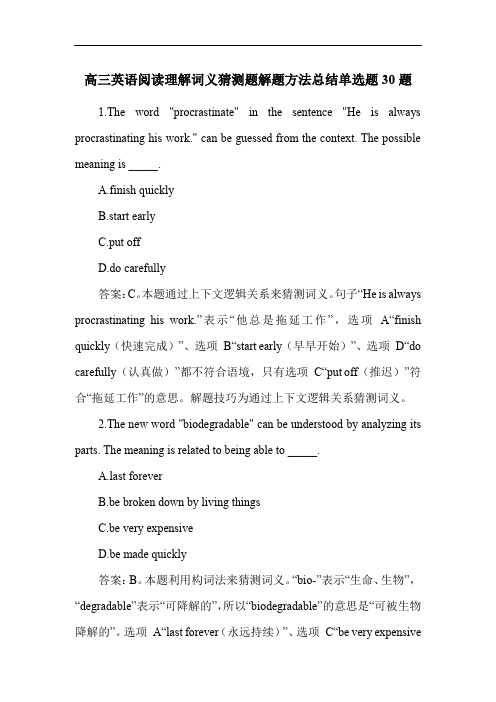
高三英语阅读理解词义猜测题解题方法总结单选题30题1.The word "procrastinate" in the sentence "He is always procrastinating his work." can be guessed from the context. The possible meaning is _____.A.finish quicklyB.start earlyC.put offD.do carefully答案:C。
本题通过上下文逻辑关系来猜测词义。
句子“He is always procrastinating his work.”表示“他总是拖延工作”,选项A“finish quickly(快速完成)”、选项B“start early(早早开始)”、选项D“do carefully 认真做)”都不符合语境,只有选项C“put off 推迟)”符合“拖延工作”的意思。
解题技巧为通过上下文逻辑关系猜测词义。
2.The new word "biodegradable" can be understood by analyzing its parts. The meaning is related to being able to _____.st foreverB.be broken down by living thingsC.be very expensiveD.be made quickly答案:B。
本题利用构词法来猜测词义。
“bio-”表示“生命、生物”,“degradable”表示“可降解的”,所以“biodegradable”的意思是“可被生物降解的”。
选项A“last forever( 永远持续)”、选项C“be very expensive非常昂贵)”、选项D“be made quickly(快速制成)”都与构词法分析出的意思不符,只有选项B“be broken down by living things 被生物分解)”符合。
中考英语阅读理解词义猜测与上下文理解题50题
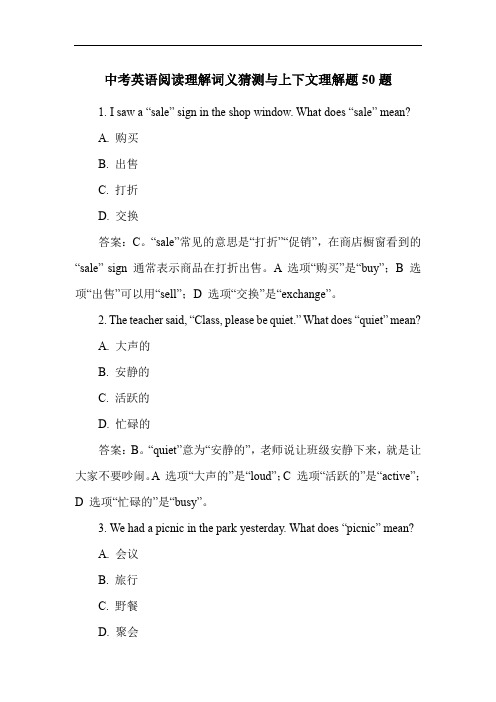
中考英语阅读理解词义猜测与上下文理解题50题1. I saw a “sale” sign in the shop window. What does “sale” mean?A. 购买B. 出售C. 打折D. 交换答案:C。
“sale”常见的意思是“打折”“促销”,在商店橱窗看到的“sale” sign 通常表示商品在打折出售。
A 选项“购买”是“buy”;B 选项“出售”可以用“sell”;D 选项“交换”是“exchange”。
2. The teacher said, “Class, please be quiet.” What does “quiet” mean?A. 大声的B. 安静的C. 活跃的D. 忙碌的答案:B。
“quiet”意为“安静的”,老师说让班级安静下来,就是让大家不要吵闹。
A 选项“大声的”是“loud”;C 选项“活跃的”是“active”;D 选项“忙碌的”是“busy”。
3. We had a picnic in the park yesterday. What does “picnic” mean?A. 会议B. 旅行C. 野餐D. 聚会答案:C。
“picnic”就是“野餐”的意思,在公园里进行的通常是野餐活动。
A 选项“会议”是“meeting”或“conference”;B 选项“旅行”是“trip”或“journey”;D 选项“聚会”是“party”。
4. The students are playing football on the playground. What does “playground” mean?A. 教室B. 操场C. 图书馆D. 实验室答案:B。
“playground”指的是“操场”,学生们踢足球通常在操场上进行。
A 选项“教室”是“classroom”;C 选项“图书馆”是“library”;D 选项“实验室”是“laboratory”。
八年级英语阅读理解词义猜测题50题

八年级英语阅读理解词义猜测题50题1. In the article about artificial intelligence, the word "sophisticated" is used to describe a program. "The new AI program has a very sophisticated algorithm that can process complex data quickly." What does "sophisticated" probably mean?A. simpleB. advancedC. basicD. old - fashioned答案:B。
解析:根据句子中提到这个人工智能程序能够快速处理复杂数据,可推断出这个算法是比较高级的,而不是简单、基础或者过时的,所以sophisticated在这里意思是advanced。
2. The passage on space exploration says: "The astronauts had to endure extreme conditions during their mission. The word "endure" means:A. avoidB. sufferC. enjoyD. create答案:B。
解析:在太空任务中提到极端的条件,宇航员应该是要忍受这些条件,而不是避免、享受或者创造这些条件,所以endure 的意思是suffer。
3. In a tech article, "The device has a miniature camera." Here"miniature" most likely means:A. largeB. tinyC. brokenD. colorful答案:B。
2025届高考英语阅读理解之词义猜测题解题策略及真题练习+课件

3. Twelve-year-old Sally was an active girl. But her sister was quite sedate.
A. pretty
B. passive C. protective D. energetic
Practice 根据上下文语境推断词义。
4. At first, Gao was a hardworking and honest man who sells fish to make a
1. Mr.Green loves to talk,and his brothers are similarly loquacious.
adj.健谈的
同义或近义 synonym or near-synonym
利用上下文中出现的同义或近义的单词或短语推知划线词的 意 思 。 常 见 信 号 词 (clues) : and, or, also, as...as, just as, similarly等
原因:because,as,since(因为),for(因为) 结果:so,thus,as a result , therefore, so that …
8.The museum is so immense that it will be impossible to see all the exhibitions in one day. adj. 大的
利用对比或转折的信号词,然后根据反义词线索猜测词义。 常见信号词/词组有:but, yet(然而), despite(尽管), however, while(但是), unfortunately(不幸地), on the other hand, on the contrary(相反), in contrast, instead of, rather than, not as…as, not the same as…等
高中英语阅读理解词义猜测题单选题40题
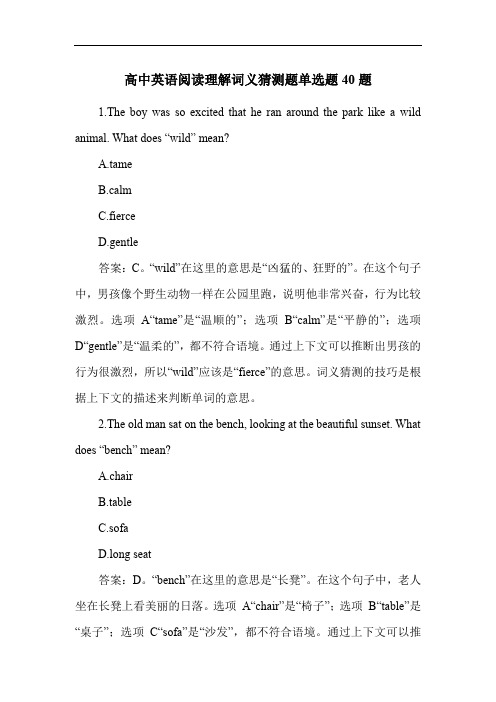
高中英语阅读理解词义猜测题单选题40题1.The boy was so excited that he ran around the park like a wild animal. What does “wild” mean?A.tameB.calmC.fierceD.gentle答案:C。
“wild”在这里的意思是“凶猛的、狂野的”。
在这个句子中,男孩像个野生动物一样在公园里跑,说明他非常兴奋,行为比较激烈。
选项A“tame”是“温顺的”;选项B“calm”是“平静的”;选项D“gentle”是“温柔的”,都不符合语境。
通过上下文可以推断出男孩的行为很激烈,所以“wild”应该是“fierce”的意思。
词义猜测的技巧是根据上下文的描述来判断单词的意思。
2.The old man sat on the bench, looking at the beautiful sunset. What does “bench” mean?A.chairB.tableC.sofaD.long seat答案:D。
“bench”在这里的意思是“长凳”。
在这个句子中,老人坐在长凳上看美丽的日落。
选项A“chair”是“椅子”;选项B“table”是“桌子”;选项C“sofa”是“沙发”,都不符合语境。
通过上下文可以推断出老人坐在一个可以坐的地方看日落,而且“bench”通常是指长凳。
词义猜测的技巧是根据上下文的描述和常识来判断单词的意思。
3.The girl was wearing a beautiful dress with colorful flowers on it. What does “colorful” mean?A.blackB.whiteC.monochromeD.multi-colored答案:D。
“colorful”在这里的意思是“多彩的”。
在这个句子中,女孩穿着一件有彩色花朵的漂亮裙子,说明裙子的颜色很丰富。
初二英语阅读理解词义猜测题单选题30题
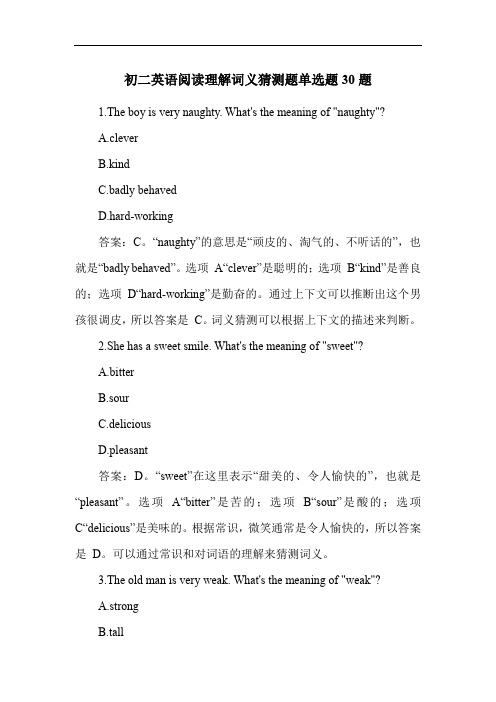
初二英语阅读理解词义猜测题单选题30题1.The boy is very naughty. What's the meaning of "naughty"?A.cleverB.kindC.badly behavedD.hard-working答案:C。
“naughty”的意思是“顽皮的、淘气的、不听话的”,也就是“badly behaved”。
选项A“clever”是聪明的;选项B“kind”是善良的;选项D“hard-working”是勤奋的。
通过上下文可以推断出这个男孩很调皮,所以答案是C。
词义猜测可以根据上下文的描述来判断。
2.She has a sweet smile. What's the meaning of "sweet"?A.bitterB.sourC.deliciousD.pleasant答案:D。
“sweet”在这里表示“甜美的、令人愉快的”,也就是“pleasant”。
选项A“bitter”是苦的;选项B“sour”是酸的;选项C“delicious”是美味的。
根据常识,微笑通常是令人愉快的,所以答案是D。
可以通过常识和对词语的理解来猜测词义。
3.The old man is very weak. What's the meaning of "weak"?A.strongB.tallC.thinD.not strong答案:D。
“weak”的意思是“虚弱的、无力的”,也就是“not strong”。
选项A“strong”是强壮的;选项B“tall”是高的;选项C“thin”是瘦的。
根据描述老人很虚弱,所以答案是D。
可以根据词语的反义来猜测词义。
4.The book is very interesting. What's the meaning of "interesting"?A.boringB.difficultC.funD.easy答案:C。
九年级英语阅读理解词义猜测题单选题40题
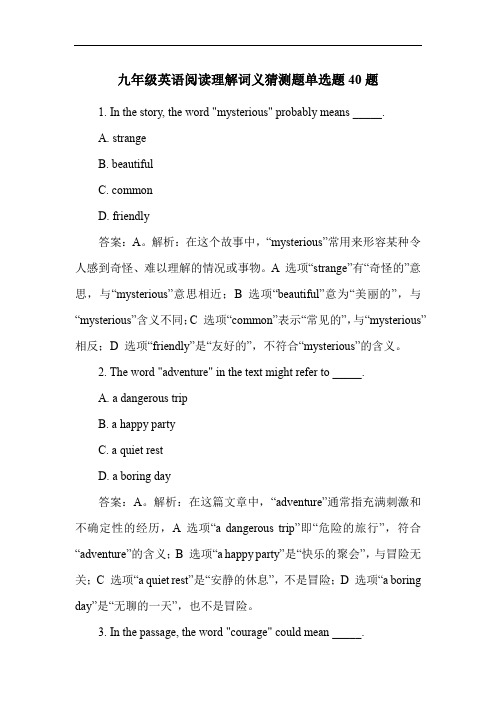
九年级英语阅读理解词义猜测题单选题40题1. In the story, the word "mysterious" probably means _____.A. strangeB. beautifulC. commonD. friendly答案:A。
解析:在这个故事中,“mysterious”常用来形容某种令人感到奇怪、难以理解的情况或事物。
A 选项“strange”有“奇怪的”意思,与“mysterious”意思相近;B 选项“beautiful”意为“美丽的”,与“mysterious”含义不同;C 选项“common”表示“常见的”,与“mysterious”相反;D 选项“friendly”是“友好的”,不符合“mysterious”的含义。
2. The word "adventure" in the text might refer to _____.A. a dangerous tripB. a happy partyC. a quiet restD. a boring day答案:A。
解析:在这篇文章中,“adventure”通常指充满刺激和不确定性的经历,A 选项“a dangerous trip”即“危险的旅行”,符合“adventure”的含义;B 选项“a happy party”是“快乐的聚会”,与冒险无关;C 选项“a quiet rest”是“安静的休息”,不是冒险;D 选项“a boring day”是“无聊的一天”,也不是冒险。
3. In the passage, the word "courage" could mean _____.A. fearB. braveryC. sadnessD. anger答案:B。
解析:在这段文字中,“courage”通常表示勇敢面对困难或危险的精神,B 选项“bravery”就是“勇敢”的意思,与“courage”意思相符;A 选项“fear”是“害怕”,与“courage”相反;C 选项“sadness”是“悲伤”,与“courage”无关;D 选项“anger”是“愤怒”,与“courage”不同。
高考英语阅读理解词义猜测题附答案
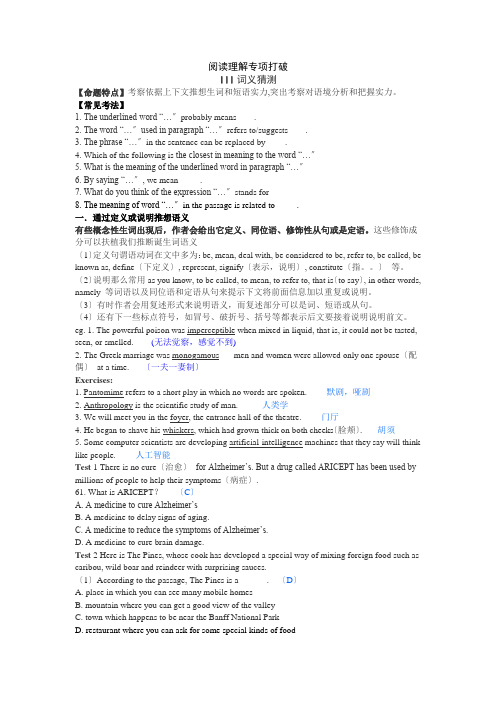
阅读理解专项打破III词义猜测【命题特点】考察依据上下文推想生词和短语实力,突出考察对语境分析和把握实力。
【常见考法】1. The underlined word “…〞probably means____.2. The word “…〞used in paragraph “…〞refers to/suggests____.3. The phrase “…〞in the sentence can be replaced by ____.4. Which of the following is the closest in meaning to the word “…〞5. What is the meaning of the underlined word in paragraph “…〞6. By saying “…〞, we mean_____.7. What do you think of the expression “…〞stands for8. The meaning of word “…〞in the passage is related to_____.一.通过定义或说明推想语义有些概念性生词出现后,作者会给出它定义、同位语、修饰性从句或是定语。
这些修饰成分可以扶植我们推断诞生词语义〔1〕定义句谓语动词在文中多为:be, mean, deal with, be considered to be, refer to, be called, be known as, define〔下定义〕, represent, signify〔表示,说明〕, constitute〔指。
〕等。
〔2〕说明那么常用as you know, to be called, to mean, to refer to, that is〔to say〕, in other words, namely 等词语以及同位语和定语从句来提示下文将前面信息加以重复或说明。
(完整版)词义猜测题

阅读理解之词义猜测题词义猜测题常见设题方式::1. The word “…” refers to / probably means / could best be replaced by _______.2.The word “…” is most likely to mean ______.3. What do you think the expression “…” stands for?4. The underlined word “…” means ______.......解题方法1. Definition 定义法2. Contrast 对比法3. Similarity 相似法4. Cause and effect 因果法5. Example 例举法6. Word Formation 构词法7. Context 上下文8. Common Sense 普通常识1. Definition 定义法:一般通过定义、定语(从句)或同位语(从句)来确定词义。
a.It will be very hard but very brittle— that is , it will break easily. ( )b.The herdsman , who looks after sheep, earns about 650 yuan a year. ( )2. Contrast 对比法:利用文中的反义词以及表对比关系的词(组)猜测词义。
表示对比的词有but、while、however、 otherwise等。
a.Most of us agreed, however, Bill dissented. ( )b.She is usually prompt for all her classes, but today she arrived in the middle of her first class.A. on timeB. lateC. slowlyD. quickly3. Similarity 相似法:利用同义词、近义词或词组猜测词义。
高三英语阅读理解词义猜测题解题方法总结单选题30题

高三英语阅读理解词义猜测题解题方法总结单选题30题1.The word "proficient" in the passage is closest in meaning to_____.A.beginnerB.intermediateC.advancedD.expert答案:D。
本题中,根据上下文可知“proficient”所在的句子描述某人在某个领域的水平较高,A 选项“beginner”初学者明显不对;B 选项“intermediate”中等水平也不符合;C 选项“advanced”虽有高级之意,但不如“expert”专业人士更符合语境。
这里通过对句子整体的理解来猜测词义,即根据上下文语境进行词义猜测。
2.The term "vibrant" as used in the text could best be replaced by_____.A.dullB.livelyC.paleD.silent答案:B。
文中提到“vibrant”的地方可以看出是在描述一个充满活力的场景,A 选项“dull”沉闷的不符合;C 选项“pale”苍白的与活力无关;D 选项“silent”安静的也不对。
通过上下文描述的场景可以猜测出“vibrant”是充满活力的意思。
3.The word "elusive" in the passage means_____.A.easy to findB.difficult to catchmonD.visible答案:B。
从文中“elusive”出现的语境可以推断出这个东西很难找到或抓住,A 选项“easy to find”容易找到错误;C 选项“common”常见的不对;D 选项“visible”可见的也不符合。
通过分析上下文的逻辑关系进行词义猜测。
4.The expression "arduous" is closest in meaning to_____.A.easyB.hardC.quickD.slow答案:B。
阅读技巧词义猜测题练习题及
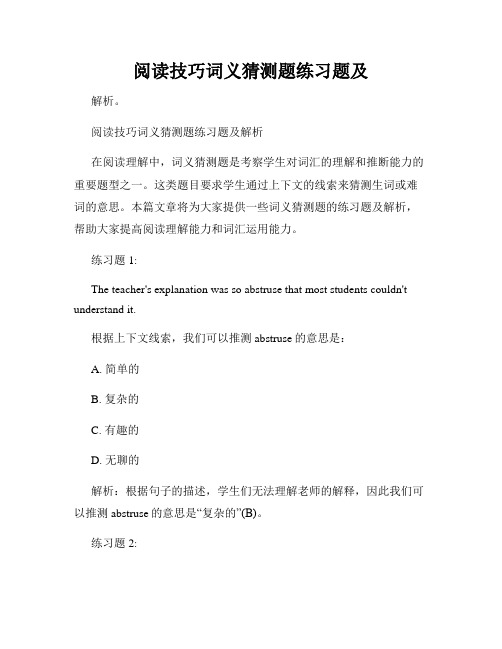
阅读技巧词义猜测题练习题及解析。
阅读技巧词义猜测题练习题及解析在阅读理解中,词义猜测题是考察学生对词汇的理解和推断能力的重要题型之一。
这类题目要求学生通过上下文的线索来猜测生词或难词的意思。
本篇文章将为大家提供一些词义猜测题的练习题及解析,帮助大家提高阅读理解能力和词汇运用能力。
练习题1:The teacher's explanation was so abstruse that most students couldn't understand it.根据上下文线索,我们可以推测abstruse的意思是:A. 简单的B. 复杂的C. 有趣的D. 无聊的解析:根据句子的描述,学生们无法理解老师的解释,因此我们可以推测abstruse的意思是“复杂的”(B)。
练习题2:The music performance was so captivating that the audience was entranced.根据上下文线索,我们可以推测captivating的意思是:A. 乏味的B. 平淡的C. 吸引人的D. 无趣的解析:根据句子描述,音乐表演非常吸引人,观众也被它迷住了,因此我们可以推测captivating的意思是“吸引人的”(C)。
练习题3:The hikers were thrilled when they reached the summit of the mountain.根据上下文线索,我们可以推测thrilled的意思是:A. 害怕的B. 高兴的C. 受惊吓的D. 失望的解析:根据句子描述,当登上山顶时,徒步旅行者们感到非常兴奋,因此我们可以推测thrilled的意思是“高兴的”(B)。
练习题4:The new employee's lackadaisical attitude towards work made his colleagues unhappy.根据上下文线索,我们可以推测lackadaisical的意思是:A. 积极的B. 懒散的C. 无聊的D. 关心的解析:根据句子描述,新员工对工作的态度懒散,使得他的同事们不开心,因此我们可以推测lackadaisical的意思是“懒散的”(B)。
2024年新高考英语一轮复习专题 21 阅读理解之词义猜测题(含答案解析)
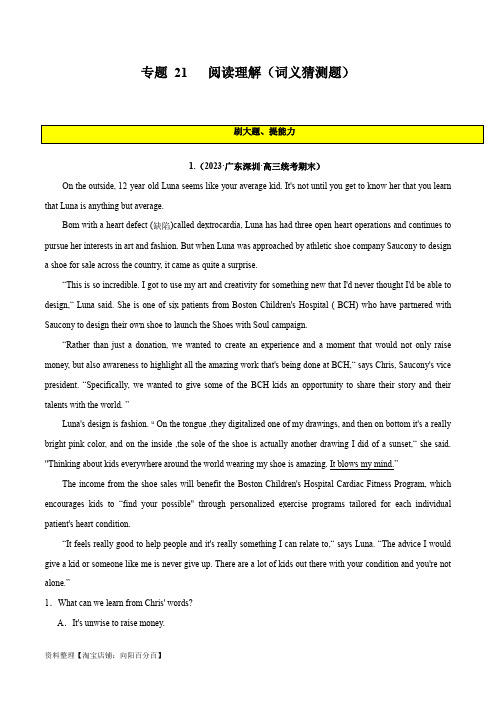
专题21 阅读理解(词义猜测题)1.(2023·广东深圳·高三统考期末)On the outside, 12-year-old Luna seems like your average kid. It's not until you get to know her that you learn that Luna is anything but average.Bom with a heart defect (缺陷)called dextrocardia, Luna has had three open-heart operations and continues to pursue her interests in art and fashion. But when Luna was approached by athletic shoe company Saucony to design a shoe for sale across the country, it came as quite a surprise.“This is so incredible. I got to use my art and creativity for something new that I'd never thought I'd be able to design,“ Luna said. She is one of six patients from Boston Children's Hospital ( BCH) who have partnered with Saucony to design their own shoe to launch the Shoes with Soul campaign.“Rather than just a donation, we wanted to create an experience and a moment that would not only raise money, but also awareness to highlight all the amazing work that's being done at BCH,“ says Chris, Saucony's vice president. “Specifically, we wanted to give some of the BCH kids an opportunity to share their story and their talents with the world. ”Luna's design is fashion. u On the tongue ,they digitalized one of my drawings, and then on bottom it's a really bright pink color, and on the inside ,the sole of the shoe is actually another drawing I did of a sunset,“ she said. "Thinking about kids everywhere around the world wearing my shoe is amazing. It blows my mind.”The income from the shoe sales will benefit the Boston Children's Hospital Cardiac Fitness Program, which encourages kids to “find your possible" through personalized exercise programs tailored for each individual patient's heart condition.“It feels really good to help people and it's really something I can relate to,“ says Luna. “The advice I would give a kid or someone like me is never give up. There are a lot of kids out there with your condition and you're not alone.”1.What can we learn from Chris' words?A.It's unwise to raise money.B.It's optional to seek donations.C.It's wonderful to study art.D.It's necessary to show kids' talents.2.What does Luna mean by “It blows my mind" in paragraph 5?A.I'm overjoyed.B.['m very serious.C.My mind goes blank.D.My mind is racing.3.Which of the following best describes Luna?A.Gifted and determined.B.Generous and serious.C.Grateful and helpful.D.Creative and sensitive.4.What is the text mainly intended to do?A.Tell us a story of a disabled girl.B.Set a good example to the disabled.C.Launch Saucony's new brand shoes.D.Introduce a campaign with kid patients.【答案】1.D 2.A 3.A 4.D【分析】这是一篇记叙文。
初三英语阅读理解技巧词义猜测题的解题技巧

初三英语阅读理解技巧词义猜测题的解题技巧初三英语阅读理解技巧:词义猜测题的解题技巧在初三英语的学习中,阅读理解是一个重要的部分,而词义猜测题则是阅读理解中的常见题型。
对于很多同学来说,这类题目可能具有一定的挑战性,但只要掌握了正确的解题技巧,就能轻松应对。
接下来,我将为大家详细介绍初三英语阅读理解中词义猜测题的解题技巧。
一、通过上下文语境猜测词义上下文语境是猜测词义最常用也是最有效的方法之一。
在阅读过程中,我们可以通过前后的句子、段落来推断生词的含义。
例如,如果生词前后出现了解释说明的语句,那么这些语句往往能帮助我们理解词义。
比如:“The term ‘ecosystem’ refers to a communityof living organisms and their environment ”在这个句子中,“refers to”后面的内容就是对“ecosystem”这个词的解释,即“生态系统是指生物群落及其环境”,从而我们可以理解“ecosystem”的意思。
再比如,有时候上下文会通过对比、类比的方式来暗示生词的词义。
如果文中提到“A is different from B B is known as a kind of vehicle, whileA is a tool used for writing ”那么我们就可以推测出 A 可能是某种书写工具。
此外,上下文的逻辑关系也能为词义猜测提供线索。
比如因果关系、转折关系等。
如果文中说“Although he was very tired, he still insisted on working ”通过“although”所表示的转折关系,我们可以猜测“insisted on”可能有“坚持”的意思。
二、利用构词法猜测词义英语中有很多单词是通过构词法构成的,了解常见的构词法可以帮助我们猜测词义。
前缀和后缀是常见的构词元素。
比如“un”“dis”“in”等前缀通常表示否定;“ful”“less”“able”“ous”等后缀可以改变单词的词性和意思。
- 1、下载文档前请自行甄别文档内容的完整性,平台不提供额外的编辑、内容补充、找答案等附加服务。
- 2、"仅部分预览"的文档,不可在线预览部分如存在完整性等问题,可反馈申请退款(可完整预览的文档不适用该条件!)。
- 3、如文档侵犯您的权益,请联系客服反馈,我们会尽快为您处理(人工客服工作时间:9:00-18:30)。
阅读中有生词是难免的,而利用文章所提供的语境去 推测生词的意义是阅读的必备技能之一。词义猜测题是高考 必考的题型,一般占阅读理解总题量的10%左右。所猜词汇 可以是生词,也可以是熟词新义,还可以是人称代词的指代 内容。
常见的命题方式: The phrase “...” could be replaced by ________. The word “...” in the paragraph refers to ________. What is the meaning of the underlined word in the paragraph?/What does the underlined word mean? Which of the following is the closest in meaning to the phrase “...”? Which of the following words can take the place of the word “...”?
词义猜测题主要考查考生根据上下文推测词义和语义 的能力,突出考查对语境的分析和把握能力。常见的猜词 法有: (1)利用上下文语境。猜测任何词义都离不开上下文,所
以要借助上下文对需要猜测的词或短语进行合乎逻辑 的推测。 (2)利用定义或解释性的线索。阅读文章中的有些生词往 往在其后会有对该词进行解释说明的短语或句子,利 用它们猜词义较容易。
The problem with his argument in the book is that it's not clear why he only focuses on digital technology, while there may be a number of other possible causes. A mapmaker might have left the crossing off a paper map. Maybe we should blame Ceely for not paying attention. Perhaps the railway authorities are at fault for poor signalling system. Or maybe someone has studied the relative dangers and worked out that there really is something specific wrong with the GPS equipment. But Stevenson doesn't say.
Who is to blame here? Rick Stevenson, who tells Ceely's story in his book When Machines Fail Us, points the finger at the limitations of technology. We put our faith in digital devices, he says, but our digital helpers are too often not up to the job. They are filled with small problems. And it's not just GPS devices: Stevenson takes us on a tour of digital disasters involving everything from mobile phones to wireless keyboards.
(3)利用文章的逻辑关系答题。如并列、对比、因果、转 折关系等。这些逻辑关系往往通过一些相应的词或短 语表达出来,如but, or, however, so, because等。
(4)利用构词法知识答题。熟记一些前缀、后缀所表达的 意思,不仅可以扩大词汇量,而且帮助我们猜测词义。
(2011·浙江高考,A篇)One evening in February 2007, a student named Paula Ceely brought her car to a stop on a remote road in Wales. She got out to open a metal gate that blocked her path. That's when she heard the whistle sounded by the driver of a train. Her Renault Clio was parked across a railway line. Seconds later, she watched the train drag her car almost a kilometre down the railway tracks.
Ceely's near miss made the news because she blamed it on her GPS device (导航仪). She had never driven the route before. It was dark and raining heavily. Ceely was relying on her GPS, but it made no mention of the crossing. “I put my complete trust in the device and it led me right into the path of a speeding train,” she told the BBC.
It's a problem that runs through the book. In a section on cars, Stevenson gives an account of the advanced techniques that criminals use to defeat computerbased locking systems for figures on car theft; both show a small rise in some parts of the country. He says that once again not all new locks have proved reliable. Perhaps, but maybe it's also due to the shortage of policemen on the streets. Or changing social circumstances. Or some combination of these factors.
